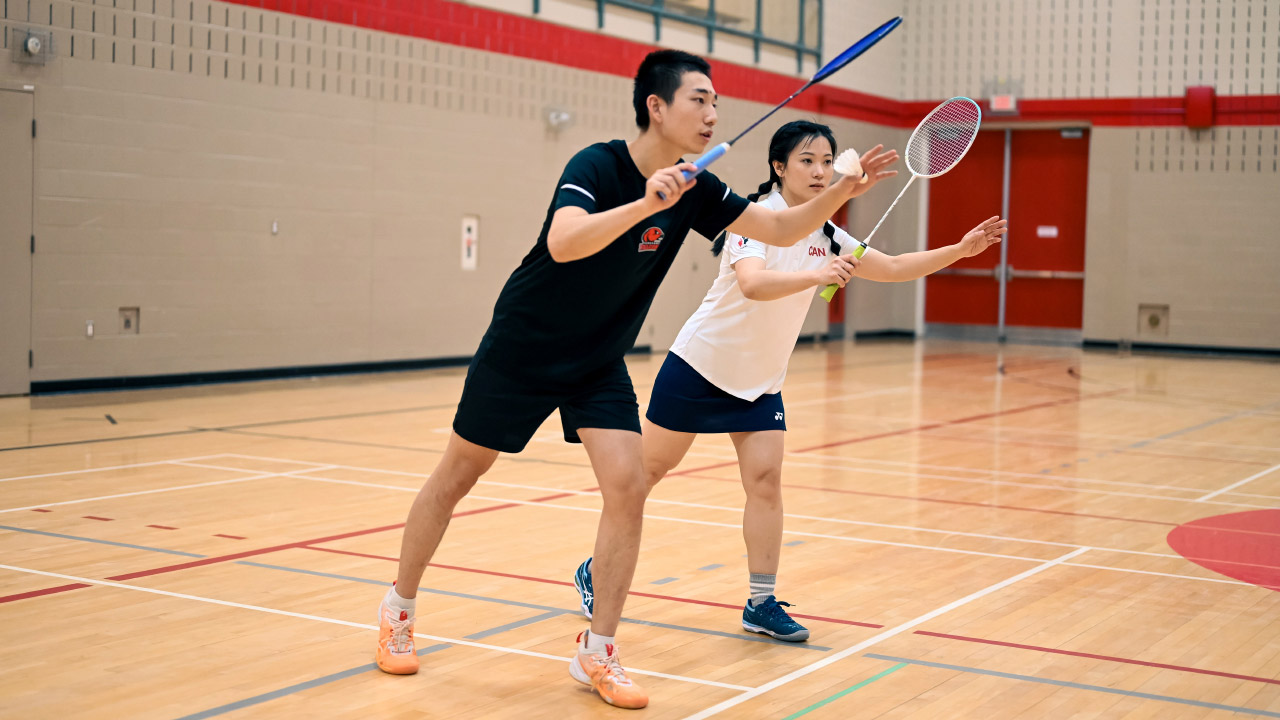Recreation Corner: Finding community and confidence at the end of a racquet
 CREDIT: FANSHAWE RECREATION
CREDIT: FANSHAWE RECREATIONJoojoo is convinced that students looking for a way to have some fun, stay fit and boost their social life should give campus recreation a try. Pictured (right to left): Michael and Xinyi Ge (Joojoo).
Mention badminton and it often evokes thoughts of a casual backyard setting. The familiar image is of a plastic-and-rubber birdie, or shuttlecock, connecting repeatedly with a small mesh racquet while friends laugh together. On the courts of a college gym, the setting may be different but the atmosphere is mostly the same. Plus, while racquets strike the shuttlecock back and forth across the net, other connections often form as well.
Xinyi Ge, who goes by the nickname Joojoo, is a Fanshawe student from Chengdu, Sichuan Province, in China. She is currently studying Baking and Pastry Arts Management, and also quickly building a strong community of friends by playing badminton through the College's campus recreation offerings.
“The first time I went to the school gym was with my friend Michael, the first friend I met in Canada, and he hoped to play badminton together,” said Joojoo. “It was a great day in my memory. I no longer feel that a school gymnasium is a strange place. For me, it is a paradise for making friends.”
Playing badminton comes with a number of social benefits, such as improving communication and teamwork skills. For example, when two or more players' primary focus is on hitting the shuttlecock back and forth, they feel less need to worry about the right words to say or ways to act. This reduced social pressure allows deeper connections to form more easily. Additionally, an implicit part of the game is the importance of encouraging others with praise and constructive feedback.
“When I play badminton in the gym, people often praise me for playing badminton very well. This makes me so happy,” Joojoo admitted.
Badminton players will quickly acknowledge there is a specific social atmosphere surrounding the court. After hitting a few shots, players tend to grow appreciative of opponents quickly, and that mutual respect within the game lends itself to a level of comfort that helps to build rapport beyond the game.
“I can communicate with strangers in English now,” Joojoo said. “When I first came to Canada, I was afraid to speak with others, so my English progressed very slowly. But now I want to meet more friends who play badminton, so I am no longer afraid to communicate.”
While players learn how to interact with each other, they also develop coordination and mental stamina through the high-speed nature of the game and the requirement for quick decision-making, strategic thinking and self-discipline during play. This translates to increased confidence over time.
“I feel relaxed and at home when participating in Fanshawe's badminton programming,” Joojoo said, pointing out that her comfort level has created opportunities to make connections and form bonds with many new people. “Because of my friend Michael, I met many badminton friends in school, including some from Vietnam, India and many other countries. My school life is no longer lonely.”
Joojoo is convinced that students looking for a way to have some fun, stay fit and boost their social life should give campus recreation a try.
“Fanshawe’s sports activities have given us an excellent social platform,” she explained. “You can meet many friends with common interests through your favourite sports activities. Everyone may come from different majors, and can help each other in their respective fields after graduation.”















